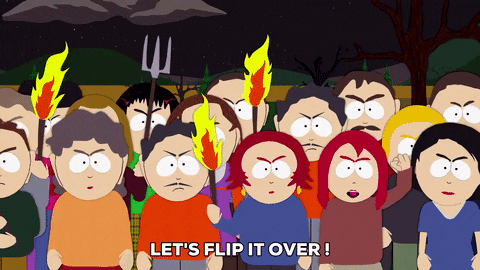A Proper Venue for Thanksgiving?
Happy Monday, dear readers!
I trust all is well and you are refreshed and eager to start a new week. Well, at least half a week, since Thanksgiving approaches. On Thursday, we can all be forward-thinking and noble, with gratitude in our hearts for all that we are lucky enough to have, and the company of our family and friends around a table laden with delicious food.
Certainly, no one would ever think of spoiling such an atmosphere by bringing up recent events that might spoil the harmony and bring on discord, right? We should all practice saying the following line so that it’s ready by the time we sit down for Thanksgiving dinner: “I know we can’t agree on this, but can we agree that it’s good to be together for a meal after such a rough year?” If that’s not likely to work, then perhaps a change of venue for dinner is appropriate.
Speaking of changing venue (see what I did there?), have you seen the very recent panel decision in the case of Shuey v. City of Redlands Police Department? Well, an application was filed in February of this year designating Marina del Rey as the venue. Defendant mailed an objection about three weeks later, but the EAMS system does not show a change of venue until August!
Defendant presented evidence from the U.S. Post Office that the objection to venue under Labor Code section 5501.5 was delivered within 30 days of service of the notice of the application. The WCJ denied the petition and recommended that removal be denied on the basis that the petition was untimely.
The WCAB granted removal and sent the matter back down for the trial level to consider the evidence of the USPS delivery proof. However, the matter would be heard further at the same venue which defendant was seeking to move out of… at least for now. In any case, I’m sure both the parties and the WCJ will consult 8 CCR 10615(b) which reflects that a “document is deemed filed when received…”.
Your humble blogger was certainly around when EAMS was just coming online, and remembers well the grumbling and complaints about the system. Well, it’s been over a decade since then and EAMS is still here and I think we’ve all gotten used to it. More than that, and as a credit to Kevin Star who oversaw its implementation, EAMS allows us to not only e-file documents, but receive a time-stamp of receipt by the WCAB.
If you are not currently an e-file, your humble blogger cannot urge you enough to become one, if for no other reason than to avoid such a situation.
In the meantime, this case serves as a friendly reminder for all of us – if the venue selected is not (1) the county where the applicant resides on the date of filing, or (2) the county where the alleged injury occurred, defendant has 30 days from receipt “of the information request form” to object to venue, and have venue transferred to option (1) or (2).
Practicing in Northern California, I can report that we regularly receive applications for injuries sustained in Northern California by employees living in Northern California, but with venue selected for Southern California. This puts defendants at a significant and, dare I say it… unfair disadvantage and it is probably a good practice to have an objection letter ready to knock these out as they come in.
Straight on till Wednesday, dear readers!
